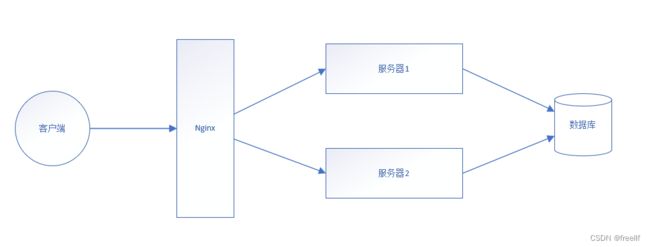Nginx简介
一、Nginx介绍
1.1 引言
为什么学习Nginx
问题1:客户端到底要将请求发送给哪台服务器
问题2:如果所有客户端的请求都发给了服务器1。
问题3:客户端发送的请求可能是申请动态资源的,也有申请静态资源。
服务器搭建集群后:
在搭建集群后,使用Nginx做反向服务器
1.2 Nginx介绍
Nginx是由俄罗斯人研发,应对Rambler网站,并且2004年发布的第一个版本
Nginx的特点:
-
稳定性极强,7*24小时不间断运行。
-
Nginx提供了非常丰富的配置实例。
-
占用内存小,并发能力强
二、Nginx的安装
2.1安装Nginx
version: "3.1"
services:
nginx:
restart: always
image: daocloud.io/library/nginx:1.12.0
container_name: nginx
ports:
- 80:80docker run -d --name nginx -p 80:80 nginx2.2 Nginx配置文件
进入Nginx容器内部: docker exec -it 99 bash
进入配置目录: cd /etc/nginx
关于Nginx的核心配置文件 nginx.conf
user nginx;
worker_processes 1;
error_log /var/log/nginx/error.log notice;
pid /var/run/nginx.pid;
# 以上统称为全局块,
# worker_processes的数值越大,Nginx的并发能力就越强
# error_log 代表Nginx的错误日志存放的位置
events {
worker_connections 1024;
}
# events块
# worker_connections的数值越大, Nginx并发能力越强
http {
include /etc/nginx/mime.types;
default_type application/octet-stream;
log_format main '$remote_addr - $remote_user [$time_local] "$request" '
'$status $body_bytes_sent "$http_referer" '
'"$http_user_agent" "$http_x_forwarded_for"';
access_log /var/log/nginx/access.log main;
sendfile on;
#tcp_nopush on;
keepalive_timeout 65;
#gzip on;
# include /etc/nginx/conf.d/*.conf;
server {
listen 80;
listen [::]:80;
server_name localhost;
location / {
root /usr/share/nginx/html;
index index.html index.htm;
}
# location 块
# root: 将接收到的请求根据/usr/share/nginx/html去查找静态资源
# index: 默认去上述的路径中找到 index.html 或者 index.htm
}
# server块
# listen 代表Nginx监听的端口号
# localhost:代表Nginx接收请求的ip
}
# http块
# include代表引入一个外部的文件 -> /mime.types中放着大量的媒体类型
# include /etc/nginx/conf.d/*.conf; -> 引入了conf.d目录下的以.conf为结尾的配置文件
2.3 修改docker-compose文件
version: "3.1"
services:
nginx:
restart: always
image: daocloud.io/library/nginx:1.12.0
container_name: nginx
ports:
- 80:80
volumes:
- /opt/nginx/conf.d/:/etc/nginx/conf.d #添加数据卷docker-compose down
docker-compose build
vi /opt/nginx/conf.d/defualt.conf
server{
listen 80;
server_name localhost;
location / {
root /usr/share/nginx/html;
index index.html index.htm;
}
}docker-compse restart
三、Nginx的反向代理
3.1正向代理和反向代理介绍
正向代理:
1.正向代理服务是由客户端设立的。
2.客户端了解代理服务器和目标服务器都是谁
3.帮助咱们实现突破访问权限,提高访问的速度,对目标服务器隐藏客户端的ip地址
反向代理:
1.反向代理服务器是配置在服务端的。
2.客户端是不知道访问的到底哪一台服务器。
3.达到负载均衡,并且可以隐藏服务器真正的ip地址
3.2基于Nginx实现反向代理
1.准备目标服务器
version: '3.1'
services:
mysql: #服务的名称
restart: always # 代表只要docker启动,那么这个容器就跟着一起启动
image: daocloud.io/library/mysql:5.7.4
container_name: mysql
ports:
- 3306:3306
environment:
MYSQL_ROOT_PASSWORD: root
TZ: Asia/Shanghai
volumes:
- /opt/docker_mysql_tomcat/data:/var/lib/mysql #映射数据卷
tomcat:
restart: always
image: daocloud.io/library/tomcat:8.5.15-jre8
container_name: tomcat
ports:
- 8080:8080
environment:
TZ: Asia/Shanghai
volumes:
- /opt/docker_mysql_tomcat/tomcat_webapps:/usr/local/tomcat/webapps
- /opt/docker_mysql_tomcat/tomcat_logs:/usr/local/tomcat/logs2.编写Nginx的配置文件,通过Nginx访问到tomcat服务器
server{
listen 80;
server_name localhost;
#基于反向代理访问到Tomcat服务器
location / {
proxy_pass http://192.168.0.252:8080/;
}
# location / {
# root /usr/share/nginx/html;
# index index.html index.htm;
# }
}3.3 关于Nginx的location路径映射
优先级关系:
(location = ) > (location /xxx/yyy/zzz) > (location ^~) > (location ~, ~*) > (location /起始路径) > (location /)
# 1. = 匹配
location = / {
# 精准匹配, 主机名后面不能带任何的字符串
}# 2. 通用匹配
location /XXX {
# 匹配所有以/xxx开头的路径
}# 3. 正则匹配
location ~ /xxx {
# 匹配所有以 /xxx 开头的路径
}# 4. 匹配开头路径
location ^~ /images/ {
# 匹配所有以 /images 开头的路径
}# 5.
location ~* \.(gif|jpg|png)$ {
# 匹配以gif或者jpg或者png为结尾的路径
}四、Nginx负载均衡
Nginx默认提供了三种负载均衡的策略:
-
轮询
将客启端发起的请求,平均的分配给每一台服务器。
-
权重
会将客户端的请求,根据服务器的权重值不同,分配不同的数据。
-
ip_hash
基于发起请求的客户端的IP地址不同,始终会装请求发送到指定的服务器上。
4.1 轮询
只需在配置文件中添加以下内容
upstream 名字 { #名子中不能包含下划线
server ip:port;
server ip:port;
...
}
server {
listen 80;
server_name localhost;
location / {
proxy_pass http://my-server/;
}
}4.2 权重
实现权重的方式
upstream 名字 { #名子中不能包含下划线
server ip:port weight=权重比例;
server ip:port weight=权重比例;
...
}
server {
listen 80;
server_name localhost;
location / {
proxy_pass http://my-server/;
}
}4.3 ip_hash
ip_hash实现
upstream 名字 { #名子中不能包含下划线
ip_hash;
server ip:port;
server ip:port;
...
}
server {
listen 80;
server_name localhost;
location / {
proxy_pass http://my-server/;
}
}五、Nginx动静分离
六、Nginx集群
(补)

